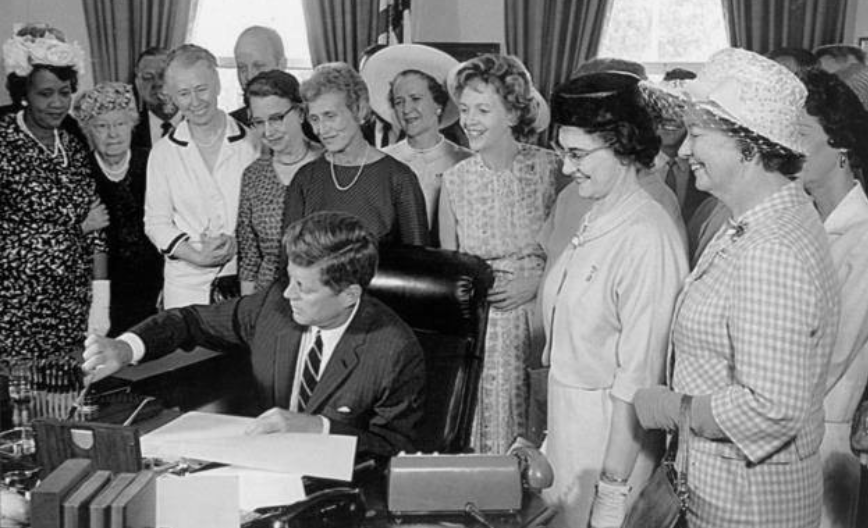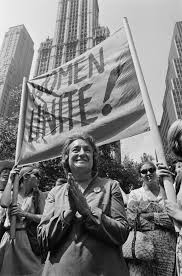Battle of the Sexes
Man vs. Woman
Background
''I raise up my voice not so that I can shout, but so that those without a voice can be heard.
We can not all succeed when half of us are held back.''
-Malala Yousafzai
Equal Rights for Women
June 10, 1963: President John F. Kennedy, signs into law the Equal Pay Act, prohibiting sex-based wage discrimination between men and women performing the same job in the same workplace. The Equal Pay Act helped women with the discrimination they were always up against with men when women did they exact same job but would get payed less. (History.com)
June 30, 1966: Betty Friedan, author of 1963’s The Feminine Mystique, helps found the National Organization for Women (NOW), using, as the organization now states “grassroots activism to promote feminist ideals, lead societal change, eliminate discrimination, and achieve and protect the equal rights of all women and girls in all aspects of social, political, and economic life.” Betty Friedan wanted to help women and girls to be equal not just in equal pay but equal rights for every women and girl. (History.com)
June 23, 1972: Title IX of the Education Amendments is signed into law by President Richard Nixon. It states “No person in the United States shall, on the basis of sex, be excluded from participation in, be denied the benefits of, or be subjected to discrimination under any education program or activity receiving Federal financial assistance." Title IX was a big step towards women's equal rights. (History.com)
Sept. 20, 1973: In “The Battle of the Sexes,” tennis great Billie Jean King beats Bobby Riggs in straight sets during an exhibition match aired on primetime TV and drawing 90 million viewers. “I thought it would set us back 50 years if I didn’t win that match,” King says after the match. “It would ruin the women’s tennis tour and affect all women’s self-esteem.” (History.com) King thought that if she didn't win that match that she would be almost ashamed of herself and she needed to win otherwise men forever thought they were the greater sex.
Women in Sports
Constant disapproval of women in "mens" sports made men think that if women were to play mens sports, women wouldn't be strong enough to compete at the same level as men. Women were thought out Lassies in the 1970's era. Women were constantly reminded about how the sports were for fun and mingling not for serious purposes. No one thought of womens sports, they all turned to the mens sports to watch. Since no one would take the women seriously for who they were and what they wanted to be they protested. Exactly 50 years after the passage of the 19th admenment of granting the women the right to vote, the women were still protesting for equal rights for themselves.

King and Riggs having friendly competition towards eachother. (All in)
The women's liberation movement brought opportunities and equal rights towards women. When title IX came out it insured federal law that makes it illegal to discriminate against a person on the basis of sex in any federally funded activity but even after Title IX was passed by Congress, women's athletic and academic opportunities in American schools still did not equal men's programs. Women increasingly started to join colleges because of the sports and feeling they can be more accepted. Women's sports were becoming more approved in colleges and high school but men still thought that women weren’t going to succeed into sports later on. The women organized something that was called the WRA (Women's Recreation Association) and this made it so the WRA sponsored all women's intramural and intercollegiate teams in sports, such as volleyball, basketball, hockey, etc. That organization sought to provide women an equal opportunity as men even if the college didn't think of the women in sports as a “varsity sport.”
In 1970 king signed a $1 contract and joined the Virginia slims circuit founded by Gladys Heldman. She did it to protest the inequity in prize money. She was in the “Original 9.” It was a group of brave women, who were also great tennis players. They protest and talk about how to make women more equal. Billie formed the women's tennis association and became the first president. (Kostman) In the 1960s and 1970s, the tournament payouts for women tennis players were significantly lower than those received by the male players. In 1971, Billie Jean became the first woman athlete to earn over $100,000 in prize money. Yet when she won the U.S. Open in 1972, she received $15,000 less than the men’s champion, Ilie Natase. (Billie Jean)



